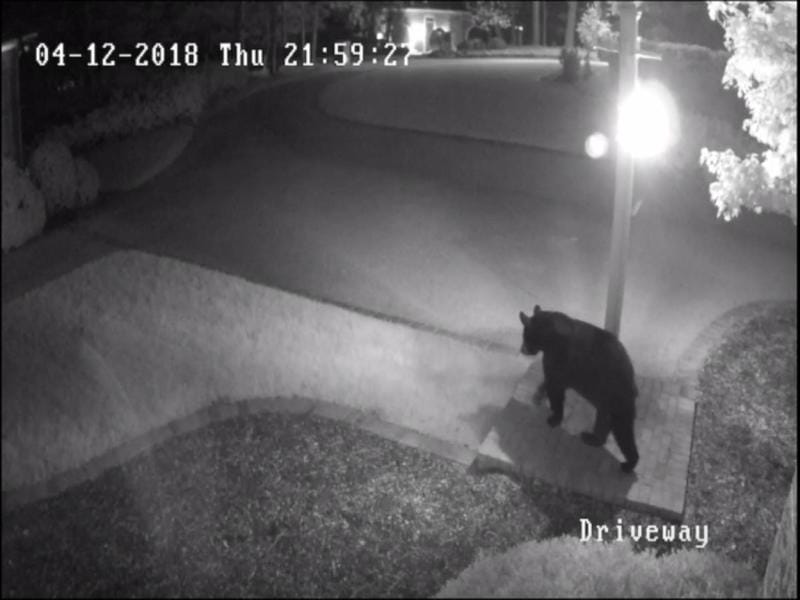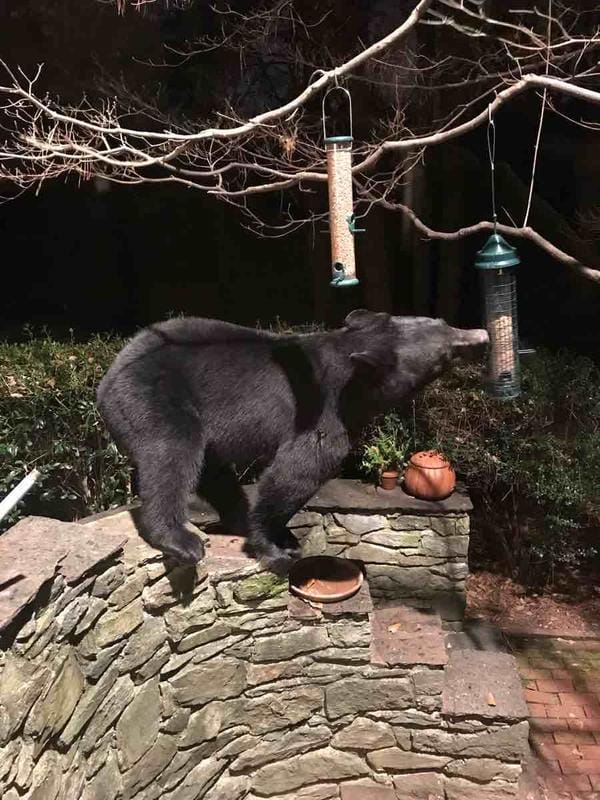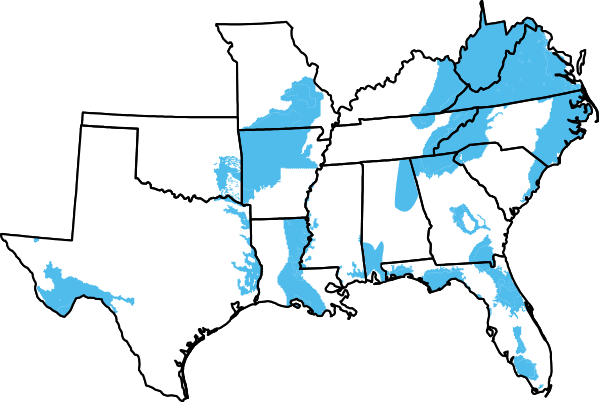

On the weekend of March 28 a resident black bear made local news when it stopped by a Buckhead backyard to pilfer the bird feeders and play with a trash can. Resident Franklin Smith captured the late night shenanigans on his security camera and posted the clips to YouTube, where the videos caught the attention of neighbors and local news agencies.
While sightings of black bears are certainly uncommon in most Buckhead neighborhoods, it would be a fallacy to believe that they never venture through our community. Leaving food out, even something as innocent as bird seed, is enough to entice hungry wildlife to wander through backyards in search of a meal.
“I like this clip where the bear plays with the trash can,” said Smith in a comment. “He is like a mouse rolling a spool of thread.”
This was not Smith’s first encounter with this particular four-legged friend on his property located about ¾ of a mile from the West Paces Ferry Shopping Center, and he notes that this instance was likely the bear’s sixth or seventh visit to the yard. While Smith says he doesn’t appreciate having to bring in the bird feeders at the end of the day, he also doesn’t mind the visits and has enjoyed watching the bear grow up in these late-night videos.
A few times each year neighborhood message boards light up with a resident shocked to find security camera footage of a bear on their back patio, one such neighbor even created a Twitter account for the Buckhead Bear. Resident Jaye Watson recently posted to Nextdoor.com: “While grilling out, I was reading on the patio and my husband walked out to tend to the grill and said In a calm, holy sh$& tone, ‘Honey, there is a black bear in our yard,’ and I whipped my head around and it was HUGE, right in our yard and was looking our way and then went into the woods in our yard. We agree he is three to four times the size of our 75 pound golden retriever.”


The short answer is probably not. Most of us will never see or encounter a bear in our communities, and when we do it is usually under the cover of nightfall when humans are not around. That being said, there are some tips to keep you and your pets safe when bears are active.
1 – Never feed or approach bears. Though this should go without saying, if you feed bears or have food on your property, it will teach the bears to approach homes in search of a meal. If and when a person gets too close to a bear the animal may react defensively which is dangerous for both human and animal. This is especially true for mama bears with cubs nearby as they are especially protective of their young cubs and will take on animals much larger than themselves to defend them. They may be cute and it might be tempting to approach them but for your own safety it is best to observe from a safe distance.
2 – Secure food, garbage, and recycling. What is simply food scraps and other waste to us is a tempting treat to a scavenging bear. Remember that bears have a stellar sense of smell, and are thought to have the best sense of smell of any animal on earth! According to the National Park Service, the area inside a bear’s nose is about 100 times larger than ours. Yes, their capacity for smell is even better – approximately 7 times – than that of a bloodhound.
3 – Remove bird feeders when bears are active. During the warmer months, from March through early December, bears are at their most active. Black bears are generally skittish around humans but an unattended birdfeeder is a temptation that is often too much for these wild creatures to pass up. If bears become accustomed to visiting your property and being rewarded with food they will continue to come back, so it’s generally a good idea to bring your bird feeders and seed inside at night.
4 – Never leave your pet’s food outdoors. We get it, some of your furry friends might spend a lot of time outside in your backyard, but consider the message you are sending to bears when you allow pet food to remain outside for extended periods. It is highly suggested to conduct any outdoor pet feedings in single portions so there are no leftovers – not even a dirty bowl which could still smell like food – after your pets have finished eating. Remember that bears are excellent climbers and will have no problem scaling your fence to get to that tasty leftover kibble.
5 – Clean your grills! As if your backyard barbecues need yet another task, it’s important to remember that the bears’ impressive sense of smell will pick up on even the faintest of residues left on your grill. When possible bring your grill back inside closed doors when not in use, and be careful to remove fat, grease, and food residue from the surface of your grill once you’ve finished cooking. On the plus side? Your grill will be perpetually ready to use!
6 – Alert your neighbors to bear activity. Just as Smith did with his now viral YouTube video, it’s a good idea to keep your neighbors in the loop when you witness bears on your property or see evidence of their presence. This will ensure that the whole neighborhood is on the lookout for bear activity and can appropriately prevent unpleasant bear-human encounters. When all your neighbors are taking precautions to deter bears they will eventually conclude that this neighborhood is no good for foraging and move on.

As of 2017, BearWise reports that Georgia is home to about 5,100 black bears, comprising around 7% of the total population of 70,000 black bears that live in the southeast. BearWise is a black bear program dedicated to providing accurate and sound information to help bears and humans coexist without issue. The organization was developed by bear experts in the southeastern states and is supported by the Southeastern Association of Fish and Wildlife Agencies.
If you spot a bear and have questions, visit the BearWise website, reach out to the Georgia Department of Natural Resources, or email the staff at AWARE Wildlife Center.